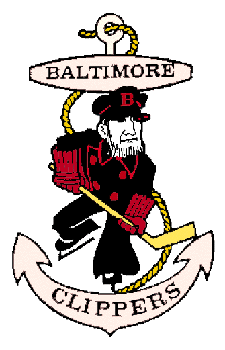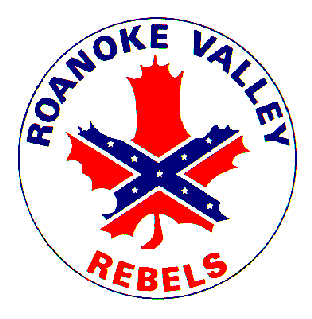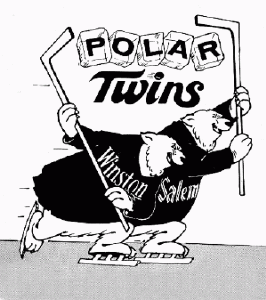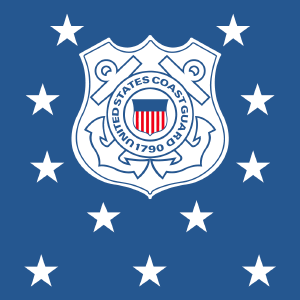
The Eastern Hockey League was a minor professional United States ice hockey league.
The Sunshine Hockey League (SuHL) was a low-level minor professional ice hockey league which operated from 1992 to 1995. The league was based in Florida and consisted of five teams in its inaugural 1992–93 season. Each team's initial head coaches were former NHL players including Bill Nyrop, West Palm Beach; Rocky Saganiuk, Daytona Beach; Jim Mikol, Lakeland Warriors; and Lou Francheschetti, Jacksonville Bullets.

The Baltimore Skipjacks were a minor league professional ice hockey team from Baltimore, Maryland, United States. The Skipjacks originated in 1979, and played as the Baltimore Clippers in the Eastern Hockey League for two seasons. The team was renamed to Skipjacks in 1981, and played the following season in the Atlantic Coast Hockey League. The Skipjacks then played eleven seasons as members of the American Hockey League (AHL), from 1982 until 1993. The Skipjacks were one of three AHL teams to have been based in Baltimore, including the Baltimore Clippers, and the Baltimore Bandits. The Skipjacks operated as a farm team to the Pittsburgh Penguins and Washington Capitals for five seasons each, and were previously a farm team to the Minnesota North Stars for two seasons, the Boston Bruins for one season. The team played its home games at the Baltimore Civic Center, which was renamed to the Baltimore Arena in 1986.

The Baltimore Clippers were a minor league professional ice hockey team from in Baltimore, Maryland, playing in the Baltimore Civic Center. The Clippers were members of the American Hockey League from 1962 to 1976, and then played one season in the Southern Hockey League. The team was managed by Terry Reardon for its first fourteen seasons, and won three division titles, but were unable to capture a Calder Cup title. Baltimore began as a farm team for the New York Rangers, and helped develop Hall of Fame players including, Eddie Giacomin, Doug Harvey, Jacques Plante and Jean Ratelle. The Clippers also featured eight alumni, who are now members of the AHL Hall of Fame. The team name "Clippers", was used by two previous professional hockey teams in Baltimore, and paid homage to local history in the Baltimore Clipper, and the Port of Baltimore.

Bayfront Center was an indoor arena located in St. Petersburg, Florida that hosted many concerts, sporting and other events. Depending on the configuration, it could hold up to 8,600 people. The arena was opened in 1965 and demolished in 2004. It adjoined the Mahaffey Theater, which is still standing.
The Troy Bruins were an International Hockey League team based in Troy, Ohio that played from 1951 to 1959 at the Hobart Arena. Notable players were Brian Kilrea and Larry King Kwong. Goaltender Bill Tibbs won the James Norris Memorial Trophy IHL for the fewest goals against during the 1955–1956 regular season.

The Southern Hockey League was a low-level minor professional ice hockey league that operated from 1973 to 1977. The league was formed when the Eastern Hockey League split in two; the southern teams became the Southern Hockey League, and the northern teams became the North American Hockey League. It was the first professional hockey league to operate wholly within the Southern United States, and followed the establishment of the Atlanta Flames in the National Hockey League; and also the Richmond Robins and the Tidewater Wings in the American Hockey League. The Southern Hockey League was a feeder league for the recently started World Hockey Association. Tedd Munchak was appointed the league's first commissioner, and was owner of the Greensboro Generals. The championship trophy of the league was named the James Crockett Cup, after local figure Jim Crockett Sr. The league disbanded during its fourth season, when four of its seven teams folded due to financial issues.
The 1971–72 Philadelphia Flyers season was the Philadelphia Flyers' fifth season in the National Hockey League (NHL). The Flyers missed the playoffs for the second time in three years.

The Charlotte Checkers were a minor league professional ice hockey team based in Charlotte, North Carolina. The team began as the Baltimore Clippers in 1954, playing in the Eastern Hockey League. When the arena in Baltimore burned down, the team briefly played as the Charlotte Rebels, before permanently relocating to the Charlotte Coliseum in 1956, becoming the Charlotte Clippers. The team was renamed the Checkers in 1960, and played its final four seasons in the Southern Hockey League, before folding in 1977. The Clippers/Checkers franchise won five playoff championships in its existence, and were the first team to be based in the Southeast United States.

The Roanoke Valley Rebels were a minor league professional ice hockey team based in the Roanoke Valley in Virginia. The team first played in the Eastern Hockey League and then joined the Southern Hockey League. The team was originally known as the Salem Rebels from 1967 to 1970, playing at the Salem Civic Center in Salem, Virginia. In 1971, the Rebels began splitting home games between Salem at the newer and larger Roanoke Civic Center in Roanoke.

The 1973–74 Southern Hockey League season was the first season of the Southern Hockey League. The league was formed when the Eastern Hockey League split in two; the southern teams became the Southern Hockey League, and the northern teams became the North American Hockey League. Four of the six founding members of the SHL came from the EHL, including the Charlotte Checkers, Greensboro Generals, Roanoke Valley Rebels, and the Suncoast Suns. Two expansion teams were added to complete the league, including the Macon Whoopees, and the Winston-Salem Polar Twins.

The 1974–75 Southern Hockey League season was the second season of the Southern Hockey League. On July 31, 1975, Jack Riley was announced as the new commissioner of the SHL, taking over for interim leader Gene Hawthorne, of the Roanoke Valley Rebels. The four existing teams returned from the previous season, joined by a fifth expansion team from Fayetteville, North Carolina. The new team was named after the Fayetteville Arsenal, and was scheduled to play at the Cumberland County Memorial Arena. In October 1974, owner Bill Raue moved the team, to Hampton, Virginia before playing any games, when availability of home ice dates became a problem. The new Hampton Gulls moved into the Hampton Coliseum recently vacated by the Virginia Wings of the American Hockey League. The five teams played a complete schedule of 72 games, with the Charlotte Checkers winning the regular season, and the playoffs.

The 1975–76 Southern Hockey League season was the third season of the Southern Hockey League. The five existing teams returned from the previous season, joined by a sixth expansion team from Norfolk, Virginia. The Tidewater Sharks joined the league owned by Virginia politician Dick Davis, playing at the Norfolk Scope. The six teams played a complete schedule of 72 games, with the Charlotte Checkers winning the regular season, and the playoffs.

The 1976–77 Southern Hockey League season was the fourth and final season of the Southern Hockey League. The Roanoke Valley Rebels ceased operations, and two new teams were added for the season. The Baltimore Clippers transferred from the American Hockey League, and the Richmond Wildcats were an expansion team. Both the Richmond Wildcats and Greensboro Generals folded on January 3, 1977 due to financial problems. On January 7, the Tidewater Sharks folded after missing payroll, and the Winston-Salem Polar Twins pulled the Polar Twins out of the league. The remaining three teams considered adding a fourth team, but the league was short on funds when Greensboro and Winstom-Salem defaulted on $25,000 loans. The league also considered playing a round-robin tournament to determine a champion, or develop an interlocking schedule with either the North American Hockey League or the International Hockey League. On January 22, 1977, both the NAHL and IHL rejected the proposal, and the final game was played on January 31, 1977, although the league planned on playing a 1977–78 season.

The Macon Whoopees were a minor league professional ice hockey team based in Macon, Georgia, and played home games at the Macon Coliseum. The Whoopees played in the Southern Hockey League, and were the second professional hockey team in Georgia. The attempt in Macon to expand hockey southward failed, as the team ceased operations before completion of the 1973–74 season. Hockey did not return to Macon until 1996, when the name was revived by the Macon Whoopee in the Central Hockey League. The original Whoopees team was named after the song "Makin' Whoopee" by Gus Kahn, and is the subject of the book Once Upon A Whoopee: A Town, A Team, A Song, A Dream, by Ed Grisamore and Bill Buckley.

The Greensboro Generals were a minor league ice hockey team based in Greensboro, North Carolina. Greensboro was part of the Eastern Hockey League from 1959 to 1973, and then played in the Southern Hockey League from 1973 to 1977. The team was founded when the Troy Bruins of the International Hockey League were relocated by owner Ken Wilson and admitted to the EHL, to play in the recently built Greensboro Coliseum.

The Winston-Salem Polar Twins were a minor league professional ice hockey team, based in Winston-Salem, North Carolina. The team was a founding member of the Southern Hockey League in 1973, and played home games at the Winston-Salem Memorial Coliseum. The initial owners of the team were a group of 15 investors, led by Ed Timmerman and Eldridge Hanes. In the 1973–74 season, Winstom-Salem finished fourth place, and lost in the first round of the playoffs under player-coach Don Carter. In 1974, Forbes Kennedy was brought in to coach, and improved results two years in a row, despite losing in the first round of the playoffs both seasons. In December 1975, the Polar Twins were sold to Jim Crockett Jr. Player-coach Ron Anderson took over in the fourth season, and the team was in last place in January. On January 7, 1977, during the team's fourth season, Crockett announced he was folding the team.

The United States Coast Guard Cutters were a senior amateur ice hockey team operated by the United States Coast Guard Yard on Curtis Bay, Baltimore. The team played in the Eastern Amateur Hockey League for parts of two seasons, using Carlin's Iceland for home games. The Cutters were a separate team from the established Coast Guard Bears of the United States Coast Guard Academy.
The Baltimore Clippers were a minor league professional ice hockey team from in Baltimore, Maryland, playing in the Eastern Amateur Hockey League at Carlin's Iceland. The team began play in the 1944–45 season known as the Baltimore Blades, and were renamed the Clippers from 1946 to 1949. The team name paid homage to local history in the Baltimore Clipper, and the Port of Baltimore. The Clippers ceased operations during the 1949–50 season.
Gregg Pilling is a Canadian former professional ice hockey player and coach. He was named coach of the year by the International Hockey League in 1977–78 season, after he led the Fort Wayne Komets to the Fred A. Huber Trophy as the regular season champions. He also won coach of the year awards in Southern Hockey League, and North American Hockey League, while guiding the Roanoke Valley Rebels and the Philadelphia Firebirds to league championships. Pilling made headlines as a coach for his colourful in-game protests and multiple ejections. Prior to coaching, he had a brief playing career, including a 1963 Memorial Cup championship with the Edmonton Oil Kings, and was voted the most valuable player in his final full season as a player.












